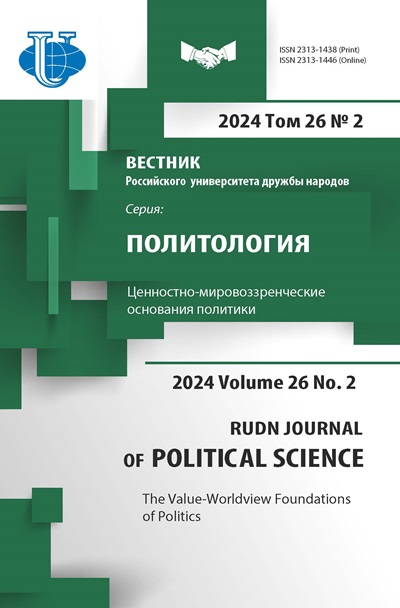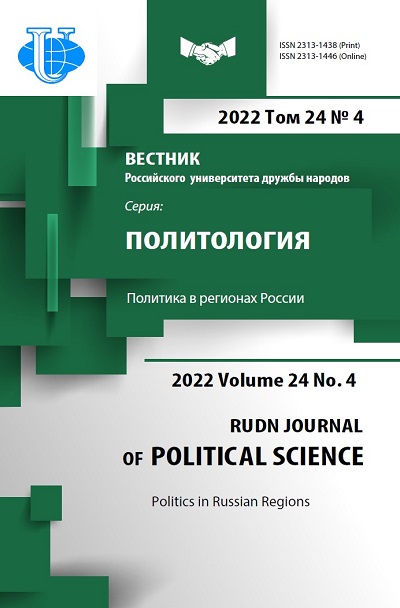Управление «незаконченным проектом»: элиты Пермского края в зеркале экспертного мнения
- Авторы: Казаринова Д.Б.1
-
Учреждения:
- Российский университет дружбы народов
- Выпуск: Том 24, № 4 (2022): Политика в регионах России
- Страницы: 711-731
- Раздел: РОССИЙСКАЯ ПОЛИТИКА С СЕВЕРА НА ЮГ И С ЗАПАДА НА ВОСТОК
- URL: https://journals.rudn.ru/political-science/article/view/32823
- DOI: https://doi.org/10.22363/2313-1438-2022-24-4-711-731
Цитировать
Полный текст
Аннотация
Пермский край и социально-политические процессы, происходящие в нем, во многом типичны для России, а потому представляют интерес для широкой аудитории исследователей и политических аналитиков. Отталкиваясь от теоретических построений международного уровня в области исследований элит и пермской школы политологии и элитологии, мы изучаем политические и бизнес-элиты региона, их политическое поведение, аспекты идентичности, а также наиболее политически чувствительные темы в жизни края. С помощью анализа литературы и последующего качественного исследования - серии полустандартизированных глубинных интервью (N10), проведенных автором с представителями региональных элит, - были получены следующие результаты. Идентичность пермяков носит несколько размытый характер, ассоциируясь с нейтральным понятием географического региона Прикамья. Либерализм в экономической сфере и относительно устойчивый межэлитный консенсус в политической сфере с опорой на технократизм характерен для политики региона, отличающейся преемственностью. Для региона характерна невысокая, относительно регионов бенчмарков Урала и Сибири, социально-политическая динамика, связанная с фактическим отсутствием регионально-ориентрованных элит и бизнесов и преобладание разного рода «варягов» в политическом классе региона. Социально-политическое и культурное пространство региона (пермский культурный проект) предстают как стартовая площадка и источник ресурсов для элит, но не получают обратных вложений. Регион при этом остается в статусе многообещающего проекта, который никак не может реализоваться.
Об авторах
Дарья Борисовна Казаринова
Российский университет дружбы народов
Автор, ответственный за переписку.
Email: kazarinova-db@rudn.ru
ORCID iD: 0000-0002-9416-5898
кандидат политических наук, доцент кафедры сравнительной политологии
Москва, Российская ФедерацияСписок литературы
- Avdokushin, E., Ponedelkov, A., & Vorontsov, S. (2015). The role of Russian federal and regional political elites in the modernization of public administration. Region: Regional Studies of Russia, Eastern Europe, and Central Asia, 4(2), 327-346. https://doi.org/10.1353/reg.2015.0017
- Badovskii, D.V., & Shutov, A. Iu. (1997). Regional elites in Post-Soviet Russia. Russian Social Science Review, 38(3), 32-55, https://doi.org/10.2753/RSS1061-1428380332
- Chirikova, A.E. (2010). Regional elites in contemporary Russia. Russian Politics & Law, 48(1), 21-39, https://doi.org/10.2753/RUP1061-1940480102
- Duka, A.V. (2012). On the approaches to power elite analysis. Administrative Consulting, 47, 48-55. (In Russian)
- Eremina, N.V. (2011). Regional political culture as a factor of state development: integration versus disintegration. Vestnik of Saint Petersburg University. International Relations, 3, 70-78. (In Russian)
- Fadeeva, L.A. (2003). Psychological foundations of political support for regional authorities. Proceedings of Conference Perm Option-2. Retrieved June 15, 2022, from http://elis.pstu.ru/ index.php?a=9&pod_id=30&pod3_id=103 (In Russian)
- Flyagin, A. (2021). Postcareer of Russian governors 1991-2020: Main directions. Bulletin of Perm University. Political Science, 15(2), 120-128
- Gaman-Golutvina, O.V. (2016). Political elites as an object of research in national political science. Political science (RU), (2), 38-73. (In Russian)
- Krasilshchikov, G.G. (2022). Local elites in the rural areas of the Perm Krai in the context of transformation (consolidation) of municipalities. Perm University Herald. Political Science, 16(1), 49-57. https://doi.org/10.17072/2218-1067-2022-1-49-57 (In Russian).
- Lapina, N. Yu., & Chirikova, A.E. (2000). Regional elite: a subject of politics and power. Subjects of the Russian Federation: legislation, organization of power and management, 42-60. Retrieved June 15, 2022, from https://cyberleninka.ru/article/n/regionalnaya-elita-cubektpolitiki-i-vlasti?ysclid=l8dby90czp223711478 (In Russian).
- Lasswell, H. D., Lerner, D., & Rothwell, C.E.(1952). The comparative study of elites: Anintroduction and bibliography. Stanford University Press. https://doi.org/10.1037/13221-000
- Leibowitz, O.L., & Shushkova, N.V. (2005). Crisis forms of political paternalism in Perm. Proceedings of Conference Russian political and economic elites. Retrieved June 15, 2022, from http://elis.pstu.ru/index.php?a=9&pod_id=32&pod3_id=223&ysclid=l7imdvko wt430625162 (In Russian)
- Leibowitz, O.L, & Shushkova, N.V. (2002). Political paternalism in Perm: socio-cultural roots. In Political Almanac of the Kama region. Issue 2. (pp. 124-133). Perm, Perm State University. (In Russian)
- Lysenko, O. (2016). Consequences of the Perm Cultural project (based on the materials of sociological research). Neprikosnovenniy Zapas, 1. Retrieved June 15, 2022, from https://magazines.gorky.media/nz/2016/1/posledstviya-permskogo-kulturnogo-proekta. html?ysclid=l7iv8j08rv327471725 (In Russian)
- Mokhov, V.P. (2003). Problems of analysis of Russian regional elites in the transition period: on the issue of methodological grounds. Proceedings of Conference Perm Option-2. Retrieved June 15, 2022, from http://elis.pstu.ru/index.php?a=9&pod_id=30&pod3_id=98 (In Russian)
- Nazukina, M.V. (2006). On the issue of the rivalry between Perm and Yekaterinburg. In Panorama of Political studies of the Kama region (pp. 164-174). Perm. (In Russian)
- Nazukina, M.V. (2018). Between the Urals and the Volga region: In search for Perm identity. Perm: Harmony Publishing. (In Russian)
- Plotnikova, E.B., & Borisova N.V. (Eds.) (2008). Sociological portrait of Perm Krai: Regional socio-cultural traditions in the context of political and administrative innovations. Perm: Perm State National Research University. (In Russian)
- Podvintsev, O.B. (2009). Governors-“Varangians” and regional political elites in modern Russia: conditions and trends of interaction. Political expertise POLITEX, 5(2), 56-71 (In Russian)
- Podvintsev, O.B. (2016). Regional identity policy in Perm region: New external challenges. Labirint: Journal of Social and Humanitarian Studies, (5), 86-91. (In Russian)
- Punina, K.A. (2003). Regional political elite of the Perm region. Proceedings of the conference Perm Elite: history, development, current state. Retrieved June 15, 2022, from http://elis.pstu.ru/index.php?a=9&pod_id=29&pod3_id=255 (In Russian).
- Rogers, D.R. (2019). ‘Bilbao on the Kama’? The Perm cultural project and its critics (Part 2). Bulletin of Perm University. Political Science, 13(2), 99-114. https://doi.org/10.17072/2218-1067-2019-2-99-114 [Rogers, D.R. (2015). The Depths of Russia: Oil, Power, and Culture after Socialism. Cornell University Press].
- Tatham, M., & Bauer, M.W. (2021). Hungry for power? Regional elites and the architecture of government. Governance: An International Journal of Policy, Administration, and Institutions, 34(3), Special Issue: The Territorial Architecture of Governance, 621-642
- Wedel, J.R. (2017). From power elites to influence elites: Resetting elite studies for the 21st century. Theory, Culture & Society, 34(5-6), 153-178. https://doi.org/10.1177/0263276417715311
- Woods, M. (1998). Rethinking elites: Networks, space, and local politics. Environment and Planning A: Economy and Space, 30(12), 2101-2119. https://doi.org/10.1068/a302101
- Zhavoronkova, K.S. (2015). Competition of Perm and Yekaterinburg cities: From the past to the present. Contentus, 11(40), 162-170. (In Russian)
















